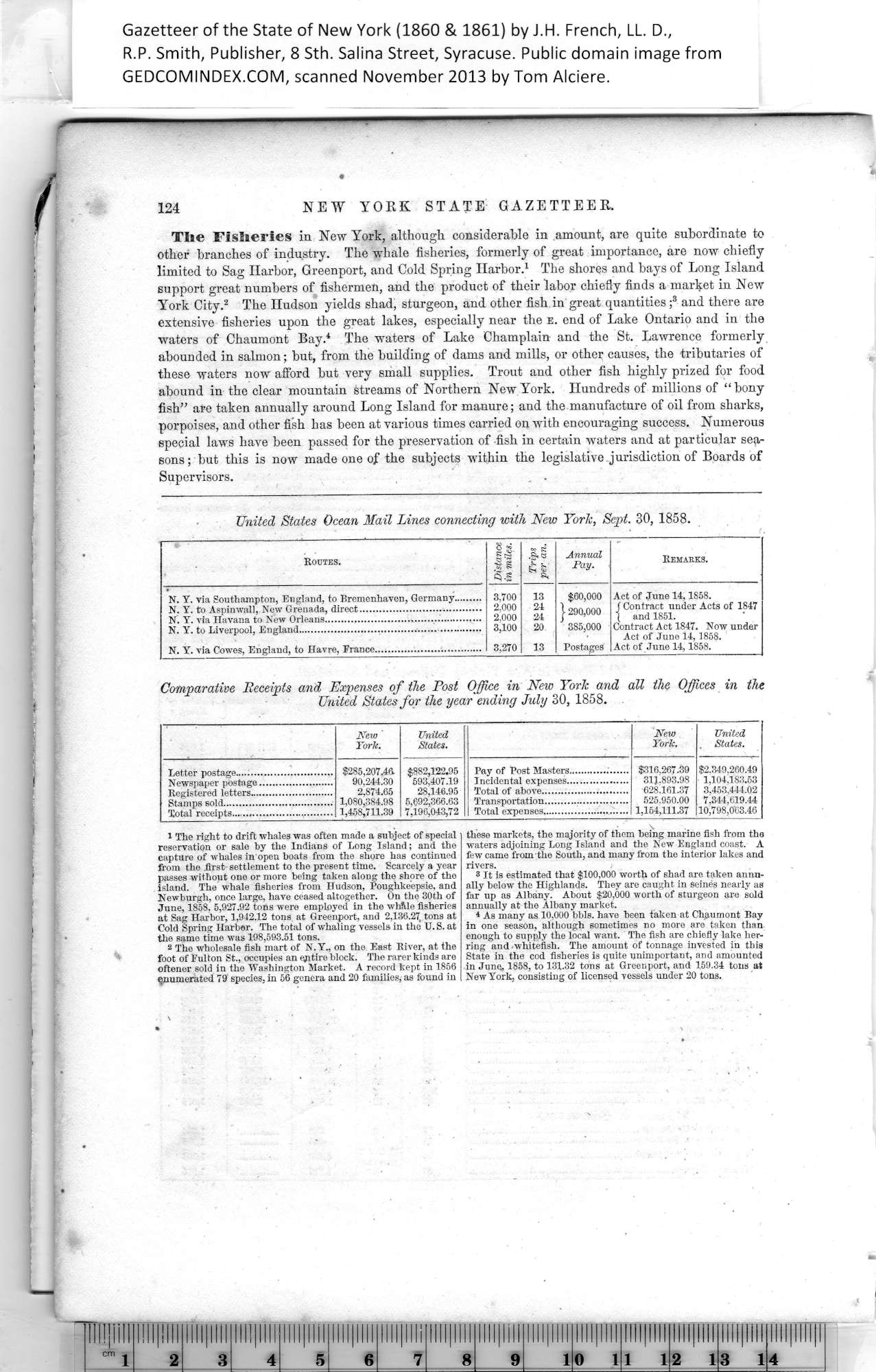|
124 NEW YORK STATE GAZETTEER.
Tlie Fisheries in New York, although considerable in amount, are quite subordinate to
other branches of industry. The whale fisheries, formerly of great importance, are now chiefly
limited to Sag Harbor, Greenport, and Cold Spring Harbor.1 The shores and bays of Long Island
support great numbers of fishermen, and the product of their labor chiefly finds a market in New
York City.2 The Hudson yields shad, sturgeon, and other fish in great quantities ;s and there are
extensive fisheries upon the great lakes, especially near the e. end of Lake Ontario and in the
waters of Chaumont Bay.1 The waters of Lake Champlain and the St. Lawrence formerly
abounded in salmon; but, from the building of dams and mills, or other causes, the tributaries of
these waters now afford but very small supplies. Trout and other fish highly prized for food
abound in the clear mountain streams of Northern NewYork. Hundreds of millions of “bony
fish” are taken annually around Long Island for manure; and the manufacture of oil from sharks,
porpoises, and other fish has been at various times carried on with encouraging success. Numerous
special laws have been passed for the preservation of fish in certain waters and at particular sea¬
sons; but this is now made one of the subjects within the legislative jurisdiction of Boards of
Supervisors.
United States Ocean Mail Lines connecting with New York, Sept. 30, 1858.
|
Routes. |
Distance
i» miles. |
Trips
per an. |
Annual
Pay. |
Remakes. |
|
N. Y. via Southampton, England, to Bremenhaven, Germany......... |
3,700 |
13 |
$60,000 |
Act of June 14, 1858. |
|
N. Y. to Aspinwall, New Grenada, direct..................................... |
2,000 |
24 |
1290,000 |
J Contract under Acts of 1847 |
|
N. Y. via Havana to New Orleans................................................ |
2,000 |
24 |
\ and 1851. |
|
N. Y. to Liverpool, England........................,............................... |
3,100 |
20 |
385,000 |
Contract Act 1847. Now under
Act of June 14, 1858. |
|
N. Y. via Cowes, England, to Havre, Prance................................. |
3,270 |
13 |
Postages |
Act of June 14,1858. |
Comparative Receipts and Expenses of the Post Office in New York and all the Offices in the
United States for the year ending July 30, 1858.
|
|
New
York. |
United
States. |
|
New
York. |
United
States. |
|
Letter postage..............................
Newspaper postage.......................
Registered letters..........................
Stamps sold..................................
Total receipts................................ |
$285,207.46.
90,244.30
2,874.65
1,080,384.98
1,458,711.39 |
$882,122.95
593,407.19
28,146.95
5,692,366.63
7,196,043,72 |
Pay of Post Masters...................
Incidental expenses...................
Total of above...........................
Transportation..........................
Total expenses........................... |
$316,267.39
311.893.98
628,161.37
525.950.00
1,154,111.37 |
$2,349,260.49
1,104,183.53
3.453,444.02
7,344.619.44
10,798,063.46 |
|
these markets, the majority of them being marine fish from the
waters adjoining Long Island and the New England coast. A
few came from the South, and many from the interior lakes and
rivers.
3 It is estimated that $100,000 worth of shad are taken annu¬
ally below the Highlands. They are caught in seines nearly as
far up as Albany. About $20,000 worth of sturgeon are sold
annually at the Albany market.
* As many as 10,000 bbls. have been taken at Chaumont Bay
in one season, although sometimes no more are taken than
enough to supply the local want. The fish are chiefly lake her¬
ring and whitefisb. The amount of tonnage invested in this
State in the cod fisheries is quite unimportant, and amounted
in June, 1858, to 131.32 tons at Greenport, and 159.34 tons at
NewYork, consisting of licensed vessels under 20 tons. |
1
The right to drift whales was often made a subject of special
reservation or sale by the Indians of Long Island; and the
capture of whales in open boats from the shore has continued
from the first settlement to the present time. Scarcely a year
passes without one or more being taken along the shore of the
island. The whale fisheries from Hudson, Poughkeepsie, and
Newburgh, once large, have ceased altogether. On the 30th of
June, 1858, 5,927.92 tons were employed in the whfile fisheries
at Sag Harbor, 1,942.12 tons at Greenport, and 2,136.27, tons at
Cold Spring Harbor. The total of whaling vessels in the U. S. at
the same time was 198,593.51 tons.
2
The wholesale fish mart of N. Y., on the East Eiver, at the
foot of Pulton St., occupies an entire block. The rarer kinds are
oftener sold in the Washington Market. A record kept in 1856
enumerated 79 species, in 56 genera and 20 families, as found in
|
